Highlights

Cocoa
In 2021, we trained 8,035 cocoa farmers in good agricultural practices, improved farm management and diversification approaches to enhance productivity. Additionally, 641,358 cocoa seedlings were raised, out of which 638,318 covering 982 hectares were distributed to 928 farmers for planting to improve their livelihoods. To promote value addition in the Liberian cocoa sector, Solidaridad integrated the Women Agri-Vocational and Entrepreneurship concept into its programme with 45 rural women’s groups, adding value to their cocoa beans production.

Palm oil
Over 1,250 artisanal mill operators and processors received training to improve the quality and quantity of palm oil. 187,000 out of 223,000 improved seedlings raised were distributed. In Ghana, a new project was co-designed with AngloGold Ashanti to reclaim degraded mine sites with oil palm trees. In Liberia, we supported the RSPO National Interpretation, which was endorsed and declared effective by the Board of Governors. Over 500 youth learners received competency-based training in oil palm, of which 75 were assisted to start micro enterprises and five obtained employment in various enterprises. In Côte d’Ivoire, we held the maiden training of 11 women from four farmers cooperatives in leadership and group management.

Gold
A total of 15 artisanal and small-scale mines improved their working conditions after Solidaridad trained them to operate responsibly in line with the CRAFT Code. Through Solidaridad’s advocacy, key components of the CRAFT Code have been incorporated into Ghana’s Artisanal and Small Scale Mining Regulatory Framework for a nationwide adoption by miners. In Ghana, a memorandum was signed with the University of Mines and Technology to improve research on ASM and improve the delivery of technical knowledge to miners. About 130 women were empowered with business management and entrepreneurship skills to enhance their access to finance through the Village Savings and Loan Associations scheme.
Results

84,000
farmers with income increase

71,000
Hectares of land under sustainable management

86,000
farmers obtaining new or improved services from supported service providers

Moving the needle
Making progress towards fair and sustainable supply chains
In 2021, we continued our work with producers across oil palm, gold, and cocoa with training on good practices and support for better policies and access to markets. In addition, we helped more farmers access digital solutions and supported children to move out of child labour situations.
In 2021, Solidaridad trained 103,472 producers and workers to improve their production practices, out of which 36,973 are producing sustainably on 71,153 hectares of land. This includes 14,356 cocoa farmers in Cote d’Ivoire who have integrated good agricultural and climate-smart practices in their production processes. Additionally, 17,358 farmers improved their income after applying the knowledge they received through training.
More than 817,900 cocoa, oil palm, coffee and economic tree seedlings were raised. This includes a total of 79,849 economic tree species planted on 80 hectares of land for agroforestry in Cote d’Ivoire.
In Ghana, a survival rate of 74 percent was recorded for over 598,000 seedlings of cashew, acacia and other economic tree species planted for agroforestry and afforestation purposes.
In Sierra Leone, more than 182,000 dwarf hybrid coffee seedlings were successfully distributed for planting on 20 newly established coffee demonstration farms and 136 hectares of individual farms. A total of 6,500 farmers in the country have been trained on intercropping and have integrated their coffee, cashew and cocoa farms with food crops such as maize, cassava, groundnut, sweet potatoes, vegetables, sorghum, plantain and banana.
Out of 715 child labour cases identified in Cote d’Ivoire, 552 (81.94 percent) children have been remediated through supplementary judgments, apprenticeship, bridging classes and the provision of school kits. The remaining 163 cases were referred to child protection services.
To help reduce the carbon footprints of rural households, 700 improved cookstoves were distributed to five rural communities to sustainably decrease their reliance on firewood and charcoal.
Solidaridad established 75 Village Savings and Loans Associations (VSLAs) with 1,500 members and continued strengthening the capacities of 2,854 associations. More than 5,000 association members were linked to microfinance companies to access credit. This includes 204 associations, in Côte d’Ivoire, who were linked to ADVANS and UNACOOPEC CI microfinance institutions. Across the region, 2,854 VSLAs mobilized 5,358,019.07 euros to invest in oil palm and cocoa production, as well as alternative livelihoods.
In Sierra Leone alone, 100 associations mobilized Le 759,000,000 (Euro 66,000) to invest in their farms and other alternative livelihood ventures.
Solidaridad West Africa continued its support for 141 existing small and medium enterprises to boost their operations. In Sierra Leone, three farm management service providers comprising 150 youth benefited from the construction of three service centers to scale up their service delivery to smallholders. In Côte d’Ivoire, six small and medium enterprises received 44,543 euros as revolving funds from three financial institutions to enhance their service delivery to farmers.
In Nigeria, Solidaridad collaborates with Zowasel, an Agricultural Technology company. Through this partnership we renovated and equipped 16 Crop Test Centres and trustees with crop test kits to serve as aggregation hubs for oil palm produce quality standards checks and linkage of producers to better markets.
In 2021, six mining service providers were selected and linked to mining companies with a monthly gold production of 2kg to enhance responsible practices. Services, including reclamation, prospecting, and ore processing, among others, were provided to 12 mines in Ghana in line with sustainability standards.
As a contribution to the consolidation of national policies for sustainable supply chains, Solidaridad convened 10 multi-stakeholder platforms across the region and contributed to the development of one policy proposal on oil palm to relevant public and private decision-makers in Sierra Leone. Forty-seven civil society organizations were trained in advocacy and policy influencing.
Moreover, advocacy for the Produce Monitoring Board of the country to provide cocoa farmers with information on cocoa market prices was adopted. The board now communicates current cocoa market prices to value-chain actors, giving farmers access to market updates. We also contributed to the development and the dissemination of Sierra Leone’s cocoa policy, which provides guidance and direction in the development of cocoa as a tree crop.
In Cote d’Ivoire, through the Child Labour Remediation and Monitoring System project, we advocated for the inclusion of child labour cases in the national system and also took part in the regional child labour platform to share lessons.
As part of efforts to promote and mainstream climate-smart oil palm production systems in Nigeria, Solidaridad signed a memorandum of understanding with state governments and five local government areas, through their Ministries of Agriculture, to support climate-smart oil palm production. In Ghana, lessons – from our work to reclaim degraded mined lands for oil palm agro-forestry and promoting energy efficiency in artisanal palm oil processing – contributed to the revision of the country’s Nationally Determined Contributions (NDCs).
Solidaridad worked with Ghana’s Food and Drugs Authority to advocate against the adulteration of palm oil with Sudan IV dye, a carcinogen. Our work with the authority also saw the enrolment of sixteen artisanal oil palm mills in progressive licensing regime which ensures that mills implement best processing practices. These practices enable them to get quality edible oil and premium prices for their produce.
In West Africa, we focused on fostering strategic alliances with private sector actors in laying a foundation for market uptake of sustainable products through linkages of farmers/farmer groups to available local and external buyers. In Ghana, a memorandum of understanding was signed with Goldridge Ghana Limited, a Ghanaian owned legally registered gold trading and export company to source CRAFT accredited gold produced by artisanal and small-scale mines for trading and export.
In Nigeria, Solidaridad’s partnership with Zowasel in 2021 will make offtaker markets available for the sourcing of sustainable and healthy food from a network of smallholder producers of palm oil, fruits and vegetables. Additionally, Solidaridad began engagements with Sierra Leone Cocoa, Coffee, and Cashew Platform to assist farmers and farmer groups with current market prices within the three commodity value chains, hence improving access to market information among farmers.
Most Significant Changes
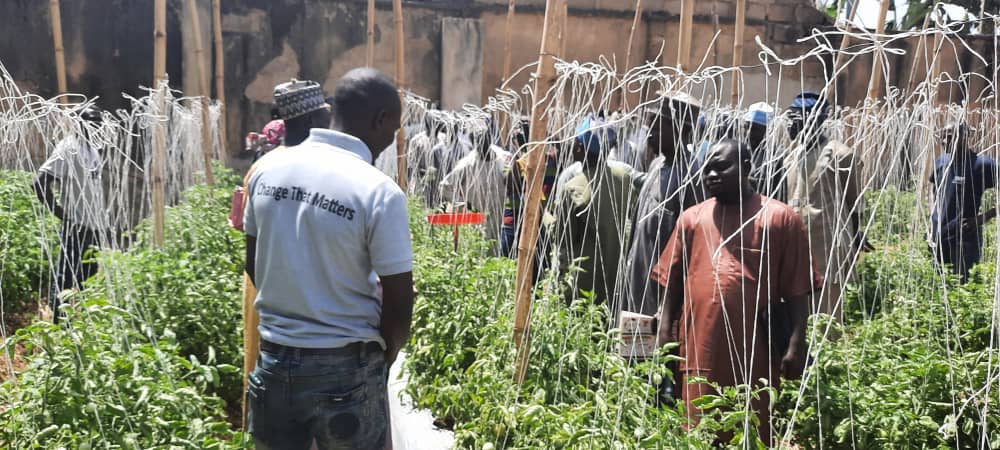
SEEING IS DOING FOR SMALLHOLDER FARMERS IN NIGERIA
In 2021, 242 demonstration farms have been established in Nigeria to support farmers in different communities to support smallholder fruits and vegetable farmers. Following weeks of observations in field demonstration farms, they are adapting climate-smart agricultural practices.
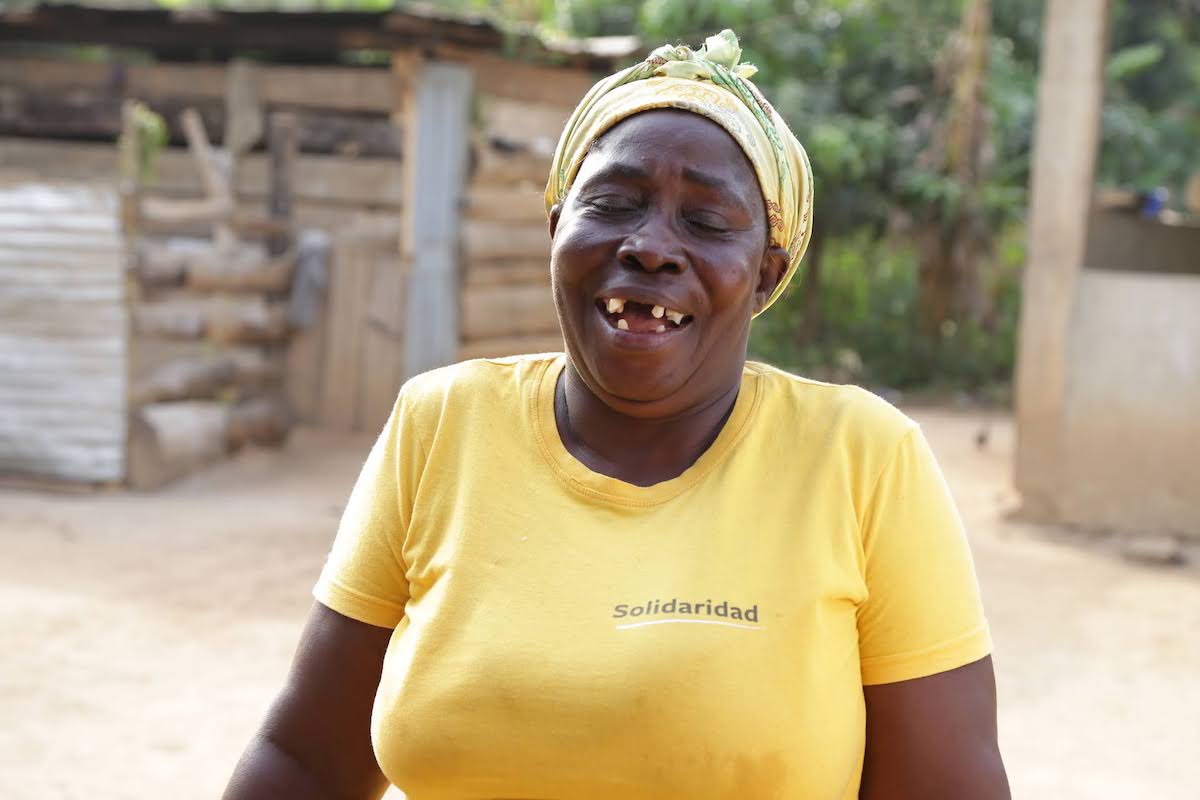
CREATING LEADERS, ONE WOMAN AT A TIME
Through the Cocoa Life programme, Solidaridad amplifies women’s voices and empowers them to take proactive roles in leadership in their communities.
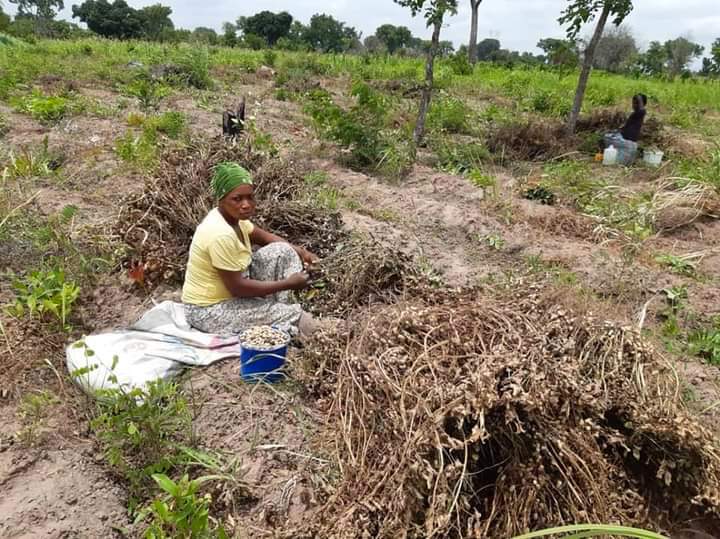
FROM BARE TO GREEN: COMMUNITY AFFORESTATION EFFORTS RESTORE DEGRADED LANDSCAPES
Over 400 acres of degraded lands in 19 communities across the Bono, Bono East and Western North regions in Ghana have been restored through various initiatives, such as the establishment of cashew and tree plantations, woodlots and watershed management.
Innovation Areas
Innovating for change
How digital solutions are transforming supply chains
Our work with Interactive Voice Response, traceability solutions, and other digital tools continued this year, showing positive results for the producers involved. Farmers and miners were able to more easily report and self-assess, and to access valuable information.

Digitized over 80% training on Interactive Voice Response
The digital team expanded the digitization of training on Interactive Voice Response in the region with an increase from 60% in 2020 to 80% in 2021. Programmes such as NISCOPS were additionally onboarded with over 12,000 oil palm farmers. Overall, there has been about 70% improvement in practices across programmes.
Gold Solution for CRAFT Code and Fair Mining
Gold Solution, a self-assessment android application, was designed and developed successfully by the digital innovation team to augment training and guide over 4,000 miners on responsible mining practices.
Developed Datawarehouse for Sat4Business for partners’ service delivery
The digital team configured and hosted the open data tool kits (called ODK) on the Amazon web services platform for the collation of data to enable partner’s integration and access to data for service provision.
Designed as a digital platform by Solidaridad to promote fair value for all actors in the oil palm supply chain, HarvestAlert seeks to facilitate the timely harvesting of fresh fruit bunches and same-day evacuation from multiple sources (smallholder farmers, nucleus plantation, aggregators, etc.) to processing mills. The application will provide information to fruit producers, buyers and users to help them make informed decisions about fresh fruit bunch harvest, sale, supply and demand. This will improve transparency and fairness between producers, aggregators, and processors.
Solidaridad, in 2021, worked with oil palm smallholder farmers to assess their needs as key inputs towards the development of the digital application. As part of designing its user interface, Solidaridad engaged technology and private sector partners, as well as oil palm aggregators for their contributions. They included Tech-Cluster, Oil Palm Development Association of Ghana (OPDAG), NORPALM, TOPP, GOPDC, Juaben Oil Mills, Abepa Ltd and Nat K Ventures.
The digital innovation team settled on a suitable architecture to support the core functionalities of the harvest alert platform. Infrastructure setup on Amazon web services platform, which forms the basis for the platform development, was completed in 2021 towards the full development of the platform in the year 2022.
Cocoa is an innovation that facilitates advocacy for fair value distribution and decent work by increasing supply chain transparency to add value at scale. It has been designed to improve traceability in the cocoa sector and help consumers to track the source of their cocoa beans through a blockchain-based supply chain mapping and traceability platform. Designed by Fairfood, the tool also provides verification of proof of payment to farmers and enables the consumer of the cocoa to read a short story of the farmer or group of farmers.
Piloted in Sierra Leone in 2021, a memorandum of understanding was signed with Randlyn Holdings Limited, a cocoa buying company, that works with over 3,000 certified cocoa farmers to work with Cocoa Trace on the first minimum traceable batch. To this end, 22,000kg (22mt) of cocoa beans have been successfully procured and data uploaded onto Trace ready for shipment in 2022.
As part of the piloting activities in 2021, basic claims like 100 percent traceability and proof of payment were developed, a small farmer group that can provide a traceable batch of cocoa was identified, partners were trained to use Trace to upload farmers data onto the system while connecting transaction data and proof of payment to farmers.
Solidaridad and Fairfood established strong connections with key stakeholders and partners, including the Ministry of Agriculture and Forestry, and the Produce Monitoring Board. It also conducted sensitization and awareness campaigns in communities identified, selected and participated in the small minimum traceable batch of cocoa. Three staff of Randlyn Holdings and two staff of Solidiaridad received training on the use of the application and uploaded 516 farmer data from 23 communities to the Trace application.
Organization & governance
Working together
A positive environment for learning and collaboration
In 2021, we supported staff by continued to offer appropriate virtual options in the face of the ongoing pandemic, while also creating opportunities to meet and exchange learning and build strong partnerships.

Solidaridad in West Africa continued its support to staff within the region by promoting an enabling virtual environment that maintains and further strengthens collaboration across teams. This was achieved by leveraging existing IT Infrastructure, enhancing communication and improving the health and well-being of employees.
To effectively respond to emerging organizational demands and external trends, we critically revised the organization’s Human Resource manual with the view to strategically position the organization to adequately meet the needs of stakeholders including employees, donors and beneficiaries.
| WAF | Female | Male | Total |
| Ghana | 17 | 48 | 65 |
| Nigeria | 6 | 13 | 19 |
| Liberia | 3 | 20 | 23 |
| Sierra leone | 8 | 29 | 37 |
| Côte D’Ivoire | 9 | 25 | 34 |
| Total | 43 | 135 | 178 |
Solidaridad in West Africa secured funding for five out of the 13 proposals submitted. The successful proposals were the Sustainable Shea Supply Chain Project (Euro 378,425) funded by the Fund for Responsible Business (FVO), the Poultry Cluster Project (Euro 449,737.50) funded by the Netherlands Enterprise Agency (RVO), The Forced and Child Labour project (Euro 900,000) funded by NORAD, the Programme for Sustainable Economic Development Project (Euro 847,615) funded by GIZ, and the L3F Ghana Cocoa Test & Learn Project (Euro 1,145,366) funded by the Livelihoods Fund. In all, a total funding of Euro 3,821,843.5 was raised in 2021.
Digital tools for capturing data were reinforced to ensure various programmes in the region are able to capture progress for decision making and effective programme implementation.
We conducted a regional outcome survey to track the implementation of programmes and understand how beneficiaries rated Solidaridad West Africa’s work over the years. The evaluation covered the following programmes: SWAPP, CORIP, COCOALIFE, MASO, LICSIP, BAFS and RSSF.
Using a multi-level sampling technique, a total of 5,061 farmers from all five operational countries were sampled for the survey.
The survey showed that more than 90 percent of the respondents had full knowledge of the work of Solidaridad in the various countries, except Côte d’Ivoire, which recorded about 78 percent.
Over 90 percent of farmers confirmed benefiting from training on good agricultural practices, sustainable production, and efficient use of inputs. They ranked the following as the top three challenges they had with the programmes implemented by Solidaridad:
- lack of input support after training
- lack of funds to implement some practices
- climate change hindering farmers’ ability to implement certain practices
Generally, many of our beneficiary farmers across programmes and countries recorded an increase in crop yield and subsequent increase in farm income with others tripling their yield compared to the baseline values. Implementation of best management practices and good agricultural practices was found to have significantly contributed to increase in yield.
In 2021, projects and programmes implemented across all five operational countries were supported to increase visibility and alignment to the corporate branding.
With a combined followership of more than 12,960 on the our west african social media platforms (Facebook, Twitter and LinkedIn), corporate visibility improved through regular posting of relevant content on these platforms. Over 720 key project activities and results were widely disseminated to reach external audiences.
Dozens of branded materials and brochures, as well as 35 short videos were produced to demonstrate programme outcomes and enhance corporate visibility and communication in alignment with the Solidaridad brand guide.
The region contributed a record 50 news articles and success stories for publication on the Solidaridad global website.
Four regional newsletters publicized new interventions and showed results of our work. Additionally, two publications were developed to catalogue the lessons and impacts of the Ghana Dedicated Grant Mechanism Project for Local Communities and the Next Generation Cocoa Youth Programme (MASO) on the lives of beneficiaries. A knowledge product that stipulates how Solidaridad leveraged on partnerships while implementing the Golden Line programme to promote sustainable mining was produced.
Strategic media engagements were harnessed to spotlight Solidaridad’s work in dozens of print and digital media, including television and radio outlets in all the five operational countries. Solidaridad secured six speaking slots for senior officers to engage stakeholders on relevant themes within the region and participated in campaigns to promote gender and youth inclusivity in sustainability programmes.
The Solidaridad Code of Conduct and the Whistleblower Protocol form the heart of the integrity system to prevent, monitor, report and account for integrity. A Partner Code is included in the contracts. Procedures that ensure a satisfactory response to a complaint and guide an investigation int
The Solidaridad Code of Conduct and the Whistleblower Protocol form the heart of the integrity system to prevent, monitor, report, and account for integrity. A Partner Code is included in the contracts. Procedures that ensure a satisfactory response to a complaint and guide an investigation into a report are in place. Solidaridad has zero-tolerance for not acting. Solidaridad will vigorously pursue disciplinary or any other actions necessary against perpetrators of any inappropriate behavior.
In 2021, a Person of Trust and Integrity Advisor for West Africa. No cases have been reported.
Finance
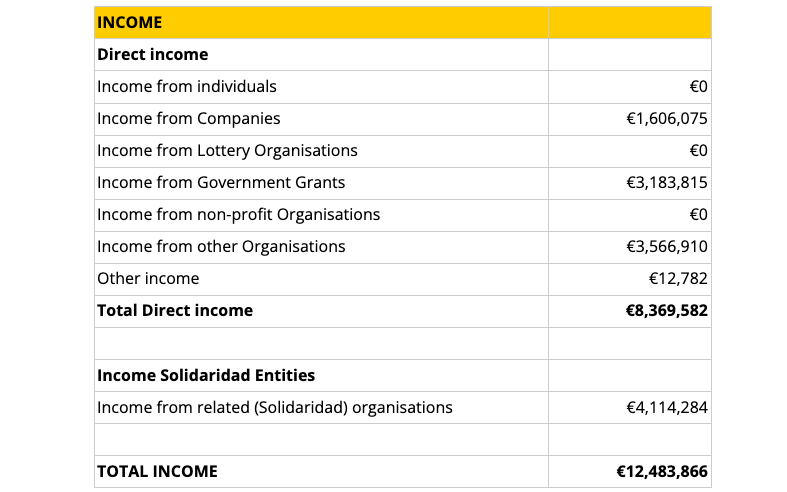
Actual income in 2021 amounted to 12.6 million Euros. This amount originates in a grant revenue of 12.4 and other income of 0.2m Euros. Out of the total income secured for 2021, 85 million Euros was generated through regional efforts and 4.1 million Euros through other Solidaridad’s entities. Total revenue decreased from 16.4 million in 2020 to 12.6 million euros in 2021, representing a reduction of 23%. This is largely related to the end of grant contracts for cocoa and climate change-related programmes. Income from private sector companies increased by 17% (1.6 million Euros) from 2020 to 2021. This is largely due to the strong relationship with Mondelez in Ghana and Cote D’Ivoire.
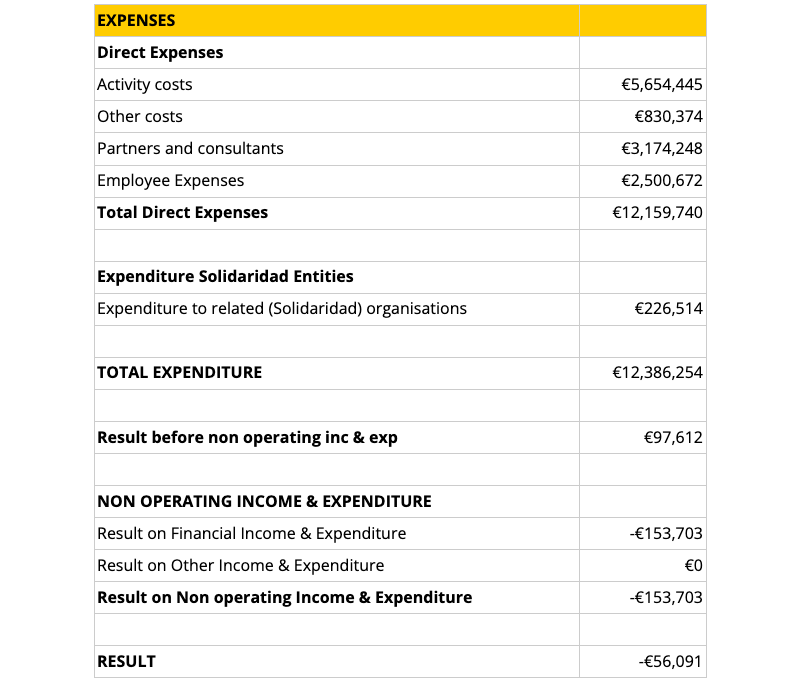
Total programme expenditure for 2021 amounted to 12.3 million Euros. This represents a reduction of 23%, compared to 16.4 million Euros in 2021. Out of the expenditure of 12.6 million Euros, staff cost constituted 20% (2.5 million Euros). Staff costs decreased by 21% from 3.1 million Euros to 2.5 million Euros. The decrease is largely due to the fact that some grant contracts ended in 2021 which resulted in a reduction of the number of programme staff. Partner and activity costs represent 79% in the amount of 9.9 million Euros of the total expenditure of 12.6m Euros.
Out of the total expenditure of 12.6 million Euros, 76% was invested in cocoa and oil palm programmes and the remaining went into food security and climate-related interventions.
Overall expenditure of 12.6 million Euros in 2021 was lower than budgeted expenditure of 15.4 million Euros, representing a burn rate of 81%.
We ended the year with a deficit of 0.56 million Euros.
The audited financial accounts can be accessed here: Solidaridad Network West Africa
